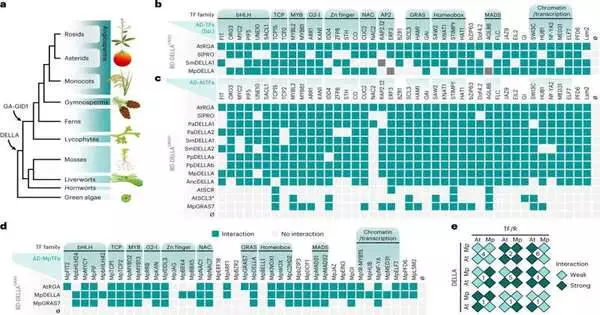Despite being largely unchanged for over 450 million years, a family of “promiscuous” proteins that is present in all land plants is responsible for a wide range of plant functions.
New research, which has been published in Nature Plants and New Phytologist, sheds light on how DELLA proteins control how much a plant grows, when germination takes place, and how plants respond to threats like disease and drought. The ability of DELLA proteins to interact with a wide variety of transcription factors, the proteins in charge of decoding DNA, rather than their propensity to change over time, is what makes them so important.
Crop scientists can design new plant proteins to produce crops with better resilience and higher yields by understanding the mechanisms underlying the functions of DELLA proteins, much like the selective breeding techniques that launched the Green Revolution in the 1960s. DELLA proteins with altered functions were present in a large number of the original Green Revolution breeding strains.
“By studying how the activity of these proteins changed through time, we can gain a better understanding of how we might be able to tune and create plants that are more adaptable to our changing environment.”
Dr. Juliet Coates, of the University of Birmingham,
Researchers from the School of Biosciences at the University of Birmingham in the UK and the Institute of Molecular and Cellular Biology of Plants (IBMCP) in Spain conducted the studies. According to Dr. Juliet Coates of the University of Birmingham, “By understanding how the activity of these proteins changed over time, we can understand more about how it might be possible to modify and engineer plants that are better adapted to our changing environment.”.
The researchers looked at mosses and liverworts, the plants that are most likely to resemble those early pioneer species, to learn how DELLA proteins changed over the 450 million years since plants first appeared on land.
Scientists already know that gibberellin, a hormone produced by plants, controls the levels of DELLA proteins in modern flowering plants, altering the levels in response to environmental factors.
They were able to demonstrate in the new studies that the DELLA proteins’ range was just as complex in early plants as opposed to having only simple interactions, and that these interactions were also distinct from those observed in modern crops like wheat or rice. Furthermore, whether or not the gibberellin hormone was present, these interactions were accessible. Additionally, a core set of interactions related to defense and reactions to low oxygen levels were discovered to be shared by all DELLA proteins.
Dr. Miguel Angel Blázquez, co-author and director of the IBMCP, stated: “A very important area of work in gibberellin biotechnology is trying to obtain varieties or chemical compounds that allow us to achieve the desired goals without the side effects. We can develop new methods to produce new DELLA variants with the desired functions by better understanding how DELLA proteins have evolved in nature over millions of years.”.
More information: Asier Briones-Moreno et al, DELLA functions evolved by rewiring of associated transcriptional networks, Nature Plants (2023). DOI: 10.1038/s41477-023-01372-6
Alexandros Phokas et al, DELLA proteins regulate spore germination and reproductive development in Physcomitrium patens, New Phytologist (2023). DOI: 10.1111/nph.18756





